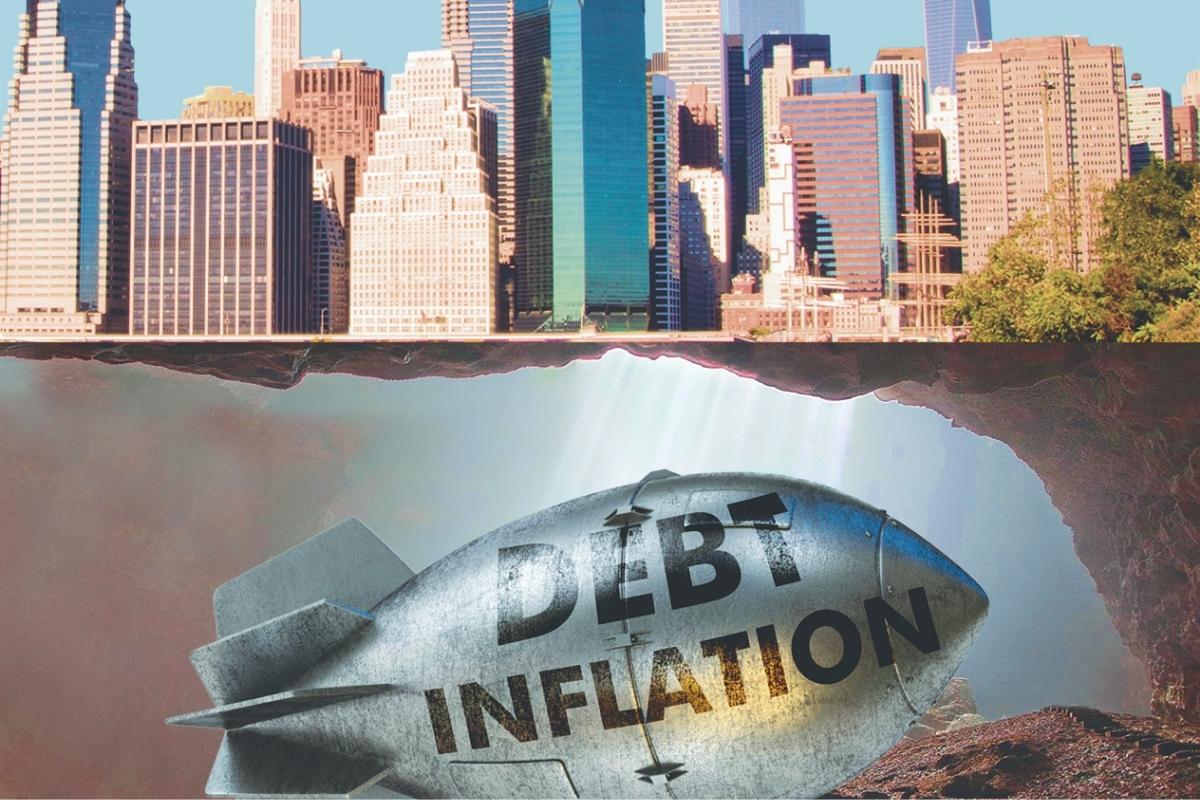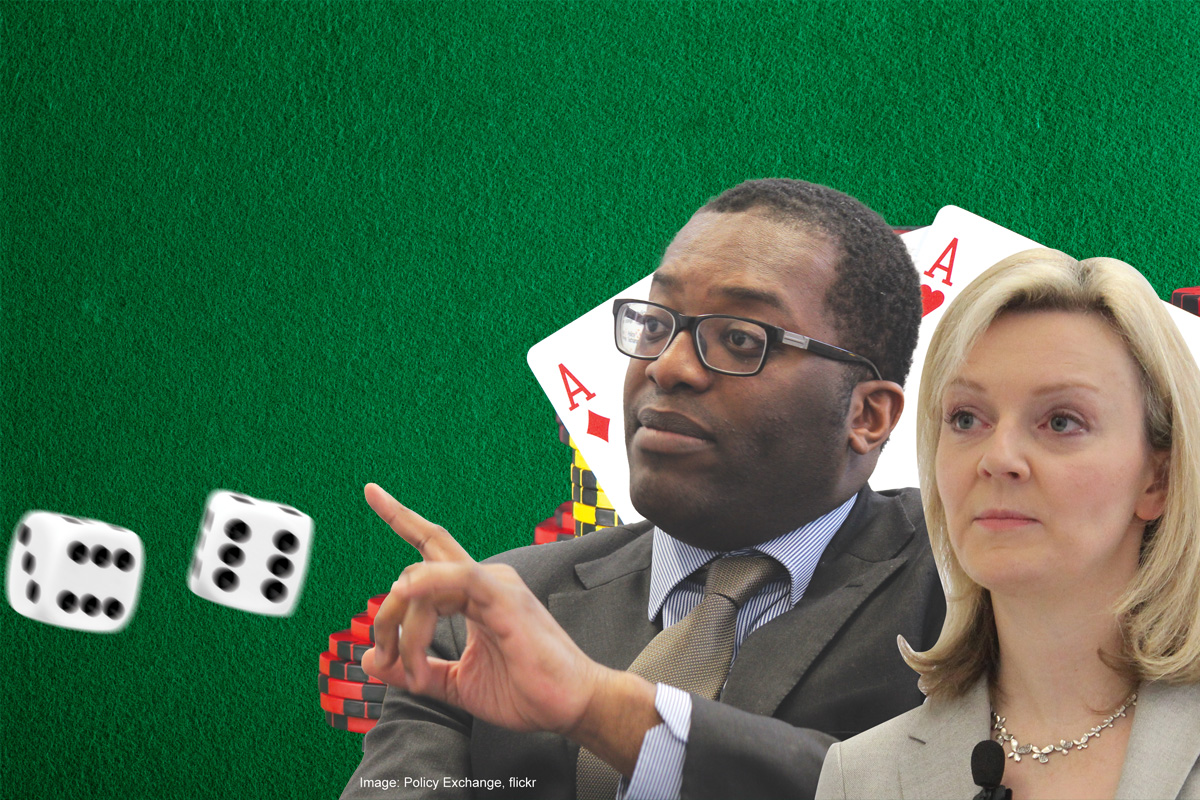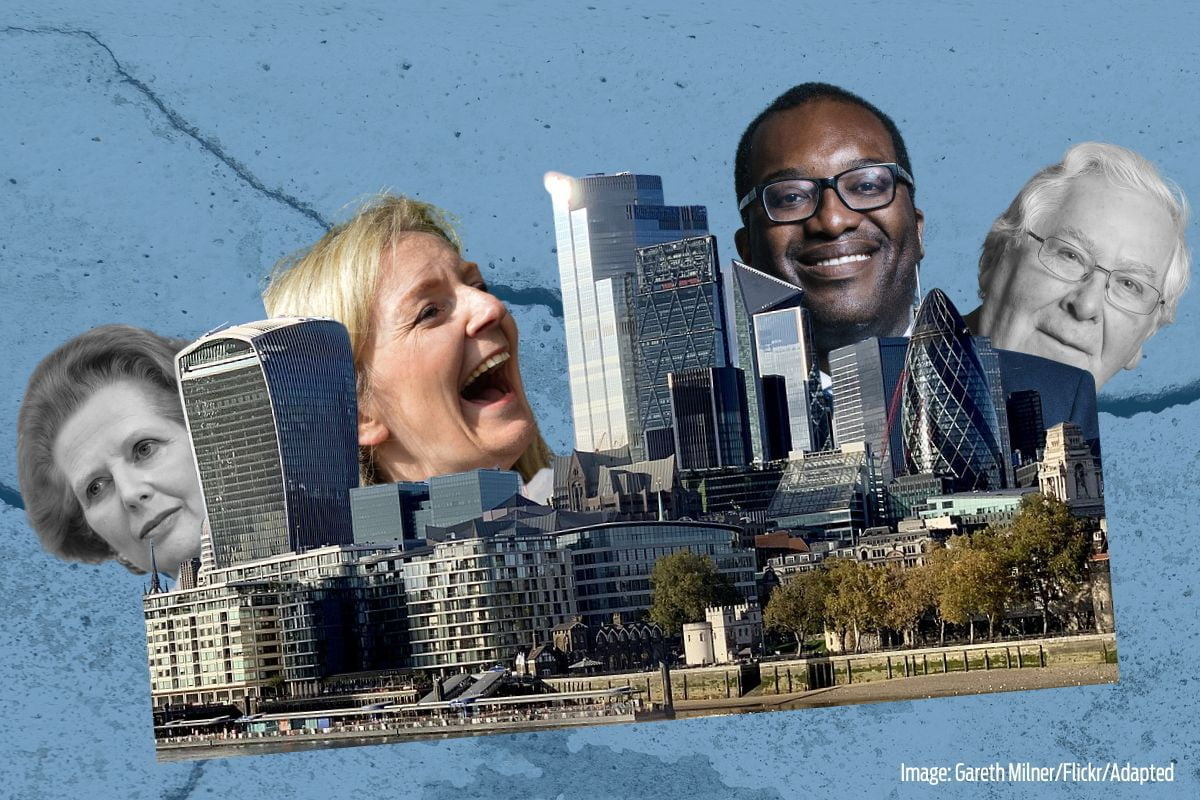The recent market turmoil in Britain has revealed the immense level of speculation that takes place in every corner of capitalism. The bankers and billionaires are gambling with our futures. It is time to overthrow their decrepit system.
According to the Bank of England, the UK economy has officially tipped into recession. And the Tories are only making matters worse with their Thatcherite economic agenda.
Investor confidence plummeted following Chancellor Kwasi Kwarteng’s disastrous mini-Budget announcement on 23 September. This was reflected in a sharp fall of the pound on currency markets, to a record low against the dollar of below $1.04.
At the same time, the cost of UK government borrowing surged, as creditors fled to safer climes. British bond yields, which rise as their price falls, rose to a 20-year high of 5.92%.
This almost resulted in the collapse of several large-scale pension schemes that held these increasingly-risky assets.
Disaster for millions of ordinary savers was only temporarily averted by a last-minute £65 billion intervention by the Bank of England (BoE).
But the danger remains, with pension managers imploring the BoE to continue their support, fearing the return of market mayhem if this vital lifeline is taken away.
This latest turbulent episode once again reveals that British capitalism is sick and rotten to the core.
Financial WMDs

The Tories have certainly poured petrol on the flames with their unhinged economic plans. But the ‘clever’ financiers running Britain’s pension schemes are just as responsible for this chaos.
In their hunt for greater returns – and therefore higher profits – they have consciously exposed pension funds to dicey debt-fuelled investment strategies.
This has direct parallels with the speculation in mortgage-backed securities that triggered the 2008 crisis.
Back then, a global crisis of capitalism was triggered by mass defaults on subprime mortgages.
These losses then spread throughout the entire financial system, through complex and risky derivatives named ‘Collateralised Debt Obligations’, or CDOs.
In hindsight, Warren Buffett, the infamous billionaire investor, aptly described CDOs as “financial weapons of mass destruction”.
History repeats itself

These derivatives represent what Marx described as ‘fictitious capital’: money thrown into the economy without any corresponding real value – in the form of actual commodities – to back it up.
Such assets are bought-up and exchanged by investors in abundance, as if they were real values. But no value exists to back them up. The result is dynamite in the foundations of the capitalist economy.
Eventually the bubble had to burst. And someone had to lose out.
Of course, it was not to be the reckless capitalists and greedy bankers who would pay for this crisis. They were bailed out by governments across the planet. Meanwhile, the working class was handed the bill, in the form of a decade of austerity and attacks.
This spectacular implosion revealed the underlying weakness in the world economy, which had become a house of cards, ready to collapse at any moment.
Now, just 14 years on, history is repeating itself. And even bourgeois commentators are describing the current pension crisis as a practical replay of the 2008 banking crisis.
Risky business

Regulation brought in after the 2008 crash may have quelled some of the more overtly dubious practices taking place within the financial system. But the gambling has not gone away. Instead, it has been pushed elsewhere – often into darker corners of the economy.
Pension schemes, for example, have invested heavily in liability-driven investment strategies, or LDIs. These LDI funds are supposed to help match the assets and liabilities of a pension pot, mostly by using a vast array of dodgy derivative bets.
In other words, these financial middlemen have sold pension schemes an array of questionable quack instruments to help ensure that they can pay out their promised benefits to savers upon retirement.
In order to provide their members the benefits that they are due, pension funds invest in the markets, looking for safe and suitable returns. Typically, therefore, pension schemes aim to be risk averse, almost exclusively investing in what are seen as low-risk assets like government bonds.
Following the 2008 crisis, however, avenues for low-risk, high-yield investment have largely dried up. This has made it harder and harder for pension schemes to find adequate returns. Hence their reliance on LDIs – these modern day snake-oil salesmen.
Furthermore, rock-bottom interest rates and a massive influx of cheap credit in the years following the 2008 crash, and again during the pandemic, have encouraged riskier forms of investment.
Doom loop
The UK’s pension regulator recommended investment into LDIs that use derivatives linked to British gilts (government bonds). But the price of these has been falling recently as markets question the Tories’ economic proposals.
By utilising such derivatives, the LDIs were supposed to free up funds for investment in higher-risk areas – like the stock market, private equity, or real estate. Instead of protecting pensioners, as intended, this ended up concentrating risk and adding to the instability.
LDI strategies were treated by investors as virtually risk-free. Once interest rates and government bond yields increased, however, the real risks were plain to see, and investors began clamouring for the exit.
As the price of British bonds slumped, the LDI’s gilt-related derivatives nosedived also. This forced fund managers to sell-off their UK bond holdings in order to obtain short-term liquidity, i.e. cash, to meet their immediate obligations.
This depressed the price of government gilts even further, setting off a ‘doom loop’ – a downward spiral of British bond prices, as investors steered clear of these increasingly-devalued assets.
Catastrophe was only averted by the £65 billion bailout from the Bank of England, which was forced to step in so as to prevent contagion spreading throughout the system.
But the problem is far from resolved. And there are deep concerns that the issue could reemerge with a bang as soon as BoE support is withdrawn: plunging pension schemes into the red; wiping out ordinary people’s savings; and provoking further turbulence on the markets.
Lives gambled

All of this comes with consequences. Politically, Truss and the Tories are completely discredited, leading to splits and division within the party and across the government. And economically, the market’s confidence in British capitalism has tanked.
In 2008, the triple-A ratings on mortgage-backed securities granted by credit rating agencies evaporated instantaneously. What was perceived as a safe and low-risk investment fell in value overnight.
Fast forward to today, and AA-rated UK gilts have taken a similar hit, increasing the cost of borrowing for the government. This, in turn, feeds into higher borrowing costs for households and businesses – already squeezed by rampant inflation and soaring energy bills.
Millions of workers in the UK (and across the world) rely on pension schemes to secure their futures and livelihoods. But now they face further uncertainty and insecurity, with the prospect of seeing their savings vanish in a puff of smoke.
This is a damning indictment of the capitalist system, where even supposedly ‘safe’ areas of investment are subject to volatility and risk.
The reality is that capitalism can never provide sanctity and prudence. There are no ‘safe spaces’ when it comes to the profit system. As long as the bankers and billionaires remain in control, they will always gamble with our lives.
Decline and decay
PM Liz Truss has blamed currency speculators for the recent collapse in the pound, and the subsequent fall in the price of UK bonds.
No doubt such speculators exist, and have played a role. But their actions are not the ultimate cause of the UK economy’s woes. Rather, these parasites – and the recent panic on the market that they have fed off – are symptoms of the rottenness of British capitalism.
Once considered the workshop of the world, Britain is characterised today by a lack of investment in real industry; the dominance of the financial sector; and a lopsided rentier economy, where speculation has wormed its way into all areas of the economy – from housing to pensions.
The expansion of unproductive sectors, such as financial and legal services, and the ever-increasing growth in speculation are a reflection of the decline and decay of British capitalism.
Era of instability

This has accelerated over the last decade-and-a-half, thanks in part to the attempts by the ruling class to get out of each crisis through quantitative easing and debt-funded government interventions.
With the credit taps fully open, speculative investors have piled into every asset and area of the economy: gold, cryptocurrencies, property, and even art.
The result is bubbles everywhere, and volatility at all levels. And recent events have exposed the cracks within the UK (and global) economy, as inflation climbs and interest rates steadily creep higher.
UK house prices could be set for a massive fall. Bitcoin and other crypto scams are tumbling. And even seemingly-safe investments like LDIs and government bonds are now being brought into question.
These shocks we are seeing – to pension schemes, property, currency values, and other pivotal parts of the economy – are not minor blips on the road to recovery and growth.
On the contrary, these are all indications of the beginnings of a new world slump; an era of crisis and instability.
Capitalism’s casino

The capitalists cannot help but speculate.
The capitalist system prioritises one thing over all else: profit. And in the context of a world economy wracked with uncertainty, instability, and oversaturated markets, speculation and gambling become a far more attractive option for the capitalists than investment in the ‘grubby’ business of production.
The whole situation seems insane to any normal person. All this absurdity is completely rational from the perspective of the capitalists, however, whose only priority is profit-making, no matter the human cost.
But what is rational for individual capitalists – short-term profiteering and rent-seeking – leads to fragility, turmoil, and havoc for the economy as a whole.
In 2007-08, ordinary people across the world risked losing their homes because of the bankers’ exploits. Now it is people’s pensions that are at stake. And who knows what will be next?
The only way to end this madness is to overthrow the capitalist system in its entirety, and replace it with a socialist planned economy.
Only under a socialist plan of production can we guarantee a stable, secure future – with a decent home and a happy, healthy life – for all, from cradle to grave
Only then can we end this financial alchemy and swindling, and instead use the world’s superabundant resources and technology to produce for the needs of society, not the parasitic profits of the fat cats.
This means taking ownership and control out of the hands of the billionaires, by nationalising the big banks, financial houses, and major monopolies – without compensation and under democratic workers’ management.
And above all, it means fighting for socialist revolution, to drive out this den of charlatans and thieves, and to shut the doors on the casino of capitalism.






